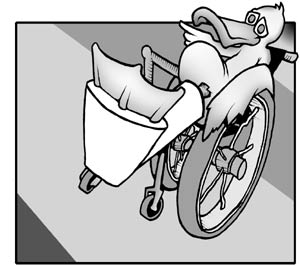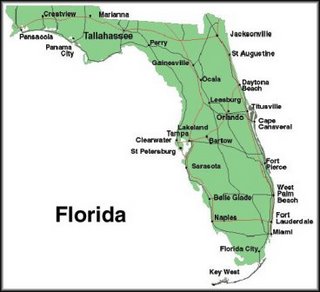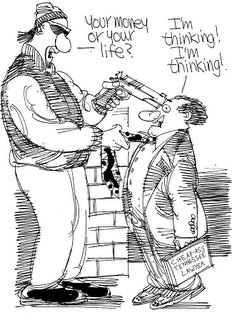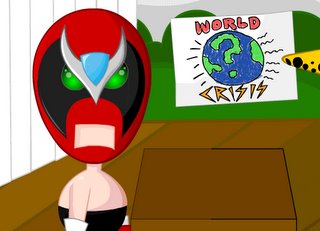We see it right here in Knox County. In spite of a recent ruling of the Tennessee Supreme Court affirming that term limits can apply to county commisioners, 12 of the 15 Knox County commissioners are running for re-election despite being term-limited out of office. Whatever the Supreme Court says apparenty just doesn't matter to the local oligarchs.
So perhaps I've been too hard on President Bush. Institutional arrogance is not limited to the highest levels of government.
March 31, 2006
Subversive to Intelligence
I recently discussed with The Wife the appalling state of high level academia, infected as it is with deconstructionism, critical theory, postmodernism, and other such nonsense. She didn't believe me until I was able to show her the random postmodernist essay generator, and explained that a longer article, written by the same program, was published in a peer-reviewed journal. In an age when scholars take seriously the idea that E=mc² is a bulwark of sexism and when an appropriately leftist-toned article condemning physics, admittedly nothing but meaningless nonsense, is published in prestigious, peer-reviewed journals, the prestige of all of the upper levels of academia should be questioned.
Far more intelligent and humorous, and equally subversive, is the recent series on Alien Loves Predator, in which Predator's "psychic" ex-girlfriend has a date with Bill Clinton.
Far more intelligent and humorous, and equally subversive, is the recent series on Alien Loves Predator, in which Predator's "psychic" ex-girlfriend has a date with Bill Clinton.
Hey, you Politicians! Quit Trying To Score Political Points Over There!
John Dean testified before the Senate today, recommending that the Congress issue some form of official rebuke to President Bush for the domestic surveillance program which the White House maintains is not subject to any form of accountability to either the judicial or legislative branches of government. Dean testified: "The president needs to be reminded that separation of powers does not mean an isolation of powers ... He needs to be told he cannot simply ignore a law with no consequences." Quite so.
 The response of arch-Republican Senator Orrin Hatch was a whining demand that Democrats should "quit trying to score political points" with this issue. What? Telling politicians to not try to score political points is like telling an accountant to stop doing math. It's what they do.
The response of arch-Republican Senator Orrin Hatch was a whining demand that Democrats should "quit trying to score political points" with this issue. What? Telling politicians to not try to score political points is like telling an accountant to stop doing math. It's what they do.
I also didn't know that only one President (Andrew Jackson) had ever been censured in U.S. history. More Presidents have been impeached than censured. Given the depth of disagreements between the executive and legislative branches that have come up throughout our history, it's remarkable that there has been such deference on the part of Congress. And the censure doesn't really have any teeth to it; it simply expresses the sense of the Congress that the President has gone too far. It doesn't purport to restrict the President's powers or remove him from office. It's not the equivalent of a "no confidence" vote in a parliamentary system, precisely because the U.S. does not have a parliamentary system.
"no confidence" vote in a parliamentary system, precisely because the U.S. does not have a parliamentary system.
If the censure resolution passes Congress, George Bush will still be President. His political authority will be undermined somewhat. But then again, he's on his way out of office anyway; there are less than a thousand days of the Bush Administration left no matter what. It's not like this has been a Golden Age for America. It has been an age of increased political polarization and it sure looks like Bush is surrounding himself with "yes" men. So if the President has screwed up, someone's got to tell him so. Does this mean "weakening" the Presidency? No -- it might weaken this particular President, but so what? We've had Presidents in wartime who lack strong political backng before. Lincoln, Truman, McKinley. Nor are we at "war" in the traditional sense of the word -- we are in a state of heightened military activity in ostensibly friendly territories (Iraq, Afghanistan, Pakistan, and at home).
And as for the President's political strength, here's the reality: the President has got a hard core of supporters who would back him up no matter what. Seriously -- if he held a joint press conference in the Rose Garden with the Prime Minister of Ireland, and halfway through taking questions from the press took out a knife and slit the Prime Minister's throat on live TV in front of the entire world, something like 25% of Americans would defend the President and say "Well, the guy must have had it coming; and hey Presidents sometimes have to do things like this."
Another aspect of political reality: there is another hard core of people who would criticize the President no matter what he did or didn't do. If Bush were to personally don combat fatigues, fly out to Afghanistan, and troop out into the mountains armed with nothing more than a Bowie knife, a compass, and a couple sticks of chewing gum, and emerge three days later in Islamabad with Osama bin Laden himself bound and gagged as a prisoner, about 20% of Americans would complain that he hadn't done it fast enough, complain that Osama had picked up a few bruises along the way, and demand the appointment of a special counsel to inquire into whether the President had committed prisoner abuse.
 An aside: I'm no fan of prisoner abuse, and I think Americans who abuse prisoners deserve to become prisoners themselves. But if it's Osama we're talking about, I think I could relax my idealism just a little bit. Should we capture him alive (big assumption), I would be pleased to see Osama get a trial. But when he's convicted (not if -- he's confessed many times in situations which would be wholly admissible), he should get executed by being thrown off the top of the newly-rebuilt World Trade Center. We can write a check to his family for the Eighth Amendment violation after the fact.
An aside: I'm no fan of prisoner abuse, and I think Americans who abuse prisoners deserve to become prisoners themselves. But if it's Osama we're talking about, I think I could relax my idealism just a little bit. Should we capture him alive (big assumption), I would be pleased to see Osama get a trial. But when he's convicted (not if -- he's confessed many times in situations which would be wholly admissible), he should get executed by being thrown off the top of the newly-rebuilt World Trade Center. We can write a check to his family for the Eighth Amendment violation after the fact.
So the question of whether the President is weakened is a question of whether people who are neither Bush-haters nor Bush-lovers will support him on a particular policy. It is not unpatriotic to disagree with the President on a particular policy, even one relating to the "war" effort. Bush has said so himself.
While it seems to me the hard core of Bush-haters is smaller than the hard core of Bush-lovers, they also seem to be louder. Both groups are equally unthinking in their responses to various activities; and therefore both groups are detestable and ultimately harmful to the political health of the country. We need a healthy political debate, because having a healthy political debate is part of what it is to be a free people.
That means that testimony like Dean's needs to be heard and evaluated. That I agree with Dean on this point is only part of the point. The point is, of course the Democrats are trying to score political points. So are the Republicans. That's what it's all about. When the Green Bay Packers play the Chicago Bears, and the Bears score a touchdown, Green Bay don't say, "Hey, quit it!" Instead, they go out on the field and try and score more points themselves. Sometimes they succeed, sometimes they don't. It wouldn't be much of a game if one team didn't play.
And it wouldn't be much of a democracy if one point of view were not expressed.
 The response of arch-Republican Senator Orrin Hatch was a whining demand that Democrats should "quit trying to score political points" with this issue. What? Telling politicians to not try to score political points is like telling an accountant to stop doing math. It's what they do.
The response of arch-Republican Senator Orrin Hatch was a whining demand that Democrats should "quit trying to score political points" with this issue. What? Telling politicians to not try to score political points is like telling an accountant to stop doing math. It's what they do.I also didn't know that only one President (Andrew Jackson) had ever been censured in U.S. history. More Presidents have been impeached than censured. Given the depth of disagreements between the executive and legislative branches that have come up throughout our history, it's remarkable that there has been such deference on the part of Congress. And the censure doesn't really have any teeth to it; it simply expresses the sense of the Congress that the President has gone too far. It doesn't purport to restrict the President's powers or remove him from office. It's not the equivalent of a
 "no confidence" vote in a parliamentary system, precisely because the U.S. does not have a parliamentary system.
"no confidence" vote in a parliamentary system, precisely because the U.S. does not have a parliamentary system.If the censure resolution passes Congress, George Bush will still be President. His political authority will be undermined somewhat. But then again, he's on his way out of office anyway; there are less than a thousand days of the Bush Administration left no matter what. It's not like this has been a Golden Age for America. It has been an age of increased political polarization and it sure looks like Bush is surrounding himself with "yes" men. So if the President has screwed up, someone's got to tell him so. Does this mean "weakening" the Presidency? No -- it might weaken this particular President, but so what? We've had Presidents in wartime who lack strong political backng before. Lincoln, Truman, McKinley. Nor are we at "war" in the traditional sense of the word -- we are in a state of heightened military activity in ostensibly friendly territories (Iraq, Afghanistan, Pakistan, and at home).
And as for the President's political strength, here's the reality: the President has got a hard core of supporters who would back him up no matter what. Seriously -- if he held a joint press conference in the Rose Garden with the Prime Minister of Ireland, and halfway through taking questions from the press took out a knife and slit the Prime Minister's throat on live TV in front of the entire world, something like 25% of Americans would defend the President and say "Well, the guy must have had it coming; and hey Presidents sometimes have to do things like this."
Another aspect of political reality: there is another hard core of people who would criticize the President no matter what he did or didn't do. If Bush were to personally don combat fatigues, fly out to Afghanistan, and troop out into the mountains armed with nothing more than a Bowie knife, a compass, and a couple sticks of chewing gum, and emerge three days later in Islamabad with Osama bin Laden himself bound and gagged as a prisoner, about 20% of Americans would complain that he hadn't done it fast enough, complain that Osama had picked up a few bruises along the way, and demand the appointment of a special counsel to inquire into whether the President had committed prisoner abuse.
 An aside: I'm no fan of prisoner abuse, and I think Americans who abuse prisoners deserve to become prisoners themselves. But if it's Osama we're talking about, I think I could relax my idealism just a little bit. Should we capture him alive (big assumption), I would be pleased to see Osama get a trial. But when he's convicted (not if -- he's confessed many times in situations which would be wholly admissible), he should get executed by being thrown off the top of the newly-rebuilt World Trade Center. We can write a check to his family for the Eighth Amendment violation after the fact.
An aside: I'm no fan of prisoner abuse, and I think Americans who abuse prisoners deserve to become prisoners themselves. But if it's Osama we're talking about, I think I could relax my idealism just a little bit. Should we capture him alive (big assumption), I would be pleased to see Osama get a trial. But when he's convicted (not if -- he's confessed many times in situations which would be wholly admissible), he should get executed by being thrown off the top of the newly-rebuilt World Trade Center. We can write a check to his family for the Eighth Amendment violation after the fact.So the question of whether the President is weakened is a question of whether people who are neither Bush-haters nor Bush-lovers will support him on a particular policy. It is not unpatriotic to disagree with the President on a particular policy, even one relating to the "war" effort. Bush has said so himself.
While it seems to me the hard core of Bush-haters is smaller than the hard core of Bush-lovers, they also seem to be louder. Both groups are equally unthinking in their responses to various activities; and therefore both groups are detestable and ultimately harmful to the political health of the country. We need a healthy political debate, because having a healthy political debate is part of what it is to be a free people.
That means that testimony like Dean's needs to be heard and evaluated. That I agree with Dean on this point is only part of the point. The point is, of course the Democrats are trying to score political points. So are the Republicans. That's what it's all about. When the Green Bay Packers play the Chicago Bears, and the Bears score a touchdown, Green Bay don't say, "Hey, quit it!" Instead, they go out on the field and try and score more points themselves. Sometimes they succeed, sometimes they don't. It wouldn't be much of a game if one team didn't play.
And it wouldn't be much of a democracy if one point of view were not expressed.
March 30, 2006
Double Standard?
Jack and Jill want to get married on Cape Cod, and then return to their home in Cleveland. They can do so.
Jane and Jill want to get married on Cape Cod, and then return to their home in Boston. They can do so.
But, Jack and Jim want to get married in Cape Cod, and then return to their home in Nashville. As of today, they can't.
Does this make even the remotest bit of sense? This is an illogical reading of the Full Faith and Credit clause of the Constitution, if you ask me. A legal arrangement made in one state must be honored in another. That's why a non-competition covenant made in Minnesota can be enforced in California, even when California law would otherwise render that contract void.
Gov. Romney is quoted in the article as saying "We don't want Massachusetts to become the Las Vegas of same-sex marriage." As The Wife sarcastically asked, "Oh, so he must want all the gays in the country to move up there and stay." She also points out in a more serious tone that weddings are big business, and by discouraging them, Massachusetts is foregoing substantial amounts of income. Of course, this is not the Supreme Court's concern, but the point stands nevertheless.
I expected different from the court that was in the vanguard of recongizing equal rights for homosexuals.
UPDATE: I still haven't found the opinion, but I have seen further discussion. It appears that the ruling was not based on the Full Faith and Credit Clause, but rather on a 1913 Massachusetts statute deferring to other states' anti-miscegenation laws. That law says what it says and after reading the statute (MGL 207-11), it certainly seems that the Supreme Judicial Court could not reach any other result without overturning that statute. Since the Court properly labored to find a way to interpret that staute without requiring its reversal, that's the result -- because Massachusetts voluntarily deferred to other states' restrictions on marriage back in 1913, a same-sex marriage in Massachusetts is only valid in another state that recognizes same-sex marriages on its own.
Prof. Dale Carpenter at Volokh Conspiracy suggests that while this is something of a setback for same-sex marriage advocates, it may be the lost battle that wins the war -- because it takes a lot of the wind out of the sails of those who argue that a Constitutional amendment defining marriage is necessary to stop same-sex couples from using Massachusetts law and the Full Faith and Credit Clause to demand recognition for their same-sex marriage license from Massachusetts, despite their own state's laws refusing to do so. Since it appears that the Supreme Judicial Court of Massachusetts has used MGL 207-11 to limiting its same-sex marriage right to Massachusetts residents only, there is no real need for this Constitutional amendment. Perhaps Prof. Carpenter has a point here.
Jane and Jill want to get married on Cape Cod, and then return to their home in Boston. They can do so.
But, Jack and Jim want to get married in Cape Cod, and then return to their home in Nashville. As of today, they can't.
Does this make even the remotest bit of sense? This is an illogical reading of the Full Faith and Credit clause of the Constitution, if you ask me. A legal arrangement made in one state must be honored in another. That's why a non-competition covenant made in Minnesota can be enforced in California, even when California law would otherwise render that contract void.
Gov. Romney is quoted in the article as saying "We don't want Massachusetts to become the Las Vegas of same-sex marriage." As The Wife sarcastically asked, "Oh, so he must want all the gays in the country to move up there and stay." She also points out in a more serious tone that weddings are big business, and by discouraging them, Massachusetts is foregoing substantial amounts of income. Of course, this is not the Supreme Court's concern, but the point stands nevertheless.
I expected different from the court that was in the vanguard of recongizing equal rights for homosexuals.
UPDATE: I still haven't found the opinion, but I have seen further discussion. It appears that the ruling was not based on the Full Faith and Credit Clause, but rather on a 1913 Massachusetts statute deferring to other states' anti-miscegenation laws. That law says what it says and after reading the statute (MGL 207-11), it certainly seems that the Supreme Judicial Court could not reach any other result without overturning that statute. Since the Court properly labored to find a way to interpret that staute without requiring its reversal, that's the result -- because Massachusetts voluntarily deferred to other states' restrictions on marriage back in 1913, a same-sex marriage in Massachusetts is only valid in another state that recognizes same-sex marriages on its own.
Prof. Dale Carpenter at Volokh Conspiracy suggests that while this is something of a setback for same-sex marriage advocates, it may be the lost battle that wins the war -- because it takes a lot of the wind out of the sails of those who argue that a Constitutional amendment defining marriage is necessary to stop same-sex couples from using Massachusetts law and the Full Faith and Credit Clause to demand recognition for their same-sex marriage license from Massachusetts, despite their own state's laws refusing to do so. Since it appears that the Supreme Judicial Court of Massachusetts has used MGL 207-11 to limiting its same-sex marriage right to Massachusetts residents only, there is no real need for this Constitutional amendment. Perhaps Prof. Carpenter has a point here.
March 29, 2006
La Ley del Derechos al Voto
 The Voting Rights Act is up for debate and renewal. When it was first passed, this law was badly needed to end abuses of voting registration laws that disenfranchised millions of Americans, particularly African-Americans in the southern states. Its (now) non-controversial provisions include bans on property requirements, literacy tests, and poll taxes as preconditions to voting. It is saddening to think that as recently as forty years ago, people were excluded from exercising their most crucial and fundamental right as citizens with this sort of nonsense.
The Voting Rights Act is up for debate and renewal. When it was first passed, this law was badly needed to end abuses of voting registration laws that disenfranchised millions of Americans, particularly African-Americans in the southern states. Its (now) non-controversial provisions include bans on property requirements, literacy tests, and poll taxes as preconditions to voting. It is saddening to think that as recently as forty years ago, people were excluded from exercising their most crucial and fundamental right as citizens with this sort of nonsense.The question is not whether the Voting Rights Act will be renewed, but how much of it will be. The debate reaches the issue of racial gerrymandering -- carving up Congressional districts to prevent or enable members of particular racial groups to be elected. Not much is likely to change; if anything, the law is likely to become more liberal than it currently is, so that Republicans are not hit with racial politics in the upcoming cycle.
One of the controversial sections of the law requires states to provide multilingual assistance to voting in districts and precincts where there are substantial numbers of non-English speakers. There is no doubt that English is the dominant language of America, and generally widespread agreement that this need not have been the case. The point, English-only advocates say, is not what our common langauge is but that we have a common language at all.
 Having travelled not too long ago to Barcelona, I can submit that society there is able to function despite the presence of more than one language in the area. The dominant language of Spain is, of course, Spanish. But in Barcelona, most people speak Catalan instead of Spanish as their primary language. That strange, lisping language was much more alien to me when The Wife and I were there than I thought it would be. "Eixample," an area of the city I much admired, is pronounced "EYES-am-pull" and the word translates roughly to "expansion." This is unlike Spanish ("extensión"), French ("expansion"), or Latin ("dilator"); Catalan is its own language. But there is no doubt that Barcelona, and the entire Catalan region, is very much part of Spain. While Barcelonans speak Catalan, they consider themselves Spaniards.
Having travelled not too long ago to Barcelona, I can submit that society there is able to function despite the presence of more than one language in the area. The dominant language of Spain is, of course, Spanish. But in Barcelona, most people speak Catalan instead of Spanish as their primary language. That strange, lisping language was much more alien to me when The Wife and I were there than I thought it would be. "Eixample," an area of the city I much admired, is pronounced "EYES-am-pull" and the word translates roughly to "expansion." This is unlike Spanish ("extensión"), French ("expansion"), or Latin ("dilator"); Catalan is its own language. But there is no doubt that Barcelona, and the entire Catalan region, is very much part of Spain. While Barcelonans speak Catalan, they consider themselves Spaniards.Canada has done just fine with two national languages, although the Francophones still seem to want to break away. Switzerland has four languages (German, French, Italian, and Romansch) and also does not lack for a national identity or cohesiveness. Few Swiss speak all three of the dominant languages of German, French, and Italian.
So I don't have any problems with non-English speakers being part of America and making accomodations to allow non-English speakers to participate in American society, and that includes voting.
 To a large degree, enabling non-English speakers to vote and review voting materials in their native language means assisting Latino voters. It's difficult to overestimate the power of the demographic shift going on around the country as our Latino population explodes. Twelve percent of American citizens, and about 30,000,000 residents of the United States, use Spanish, not English, as their first language. Stereotypically, these are working-class people who are not politically active. But that stereotype is not borne out in reality. Latinos, and Spanish speakers generally, are all over the board in terms of wealth, profession, and political behavior.
To a large degree, enabling non-English speakers to vote and review voting materials in their native language means assisting Latino voters. It's difficult to overestimate the power of the demographic shift going on around the country as our Latino population explodes. Twelve percent of American citizens, and about 30,000,000 residents of the United States, use Spanish, not English, as their first language. Stereotypically, these are working-class people who are not politically active. But that stereotype is not borne out in reality. Latinos, and Spanish speakers generally, are all over the board in terms of wealth, profession, and political behavior.While I'm not a fan of the President, I still consider myself a nominal Republican. And it really bothers me to learn that Republicans are going to resist this -- and I can't address the issue in an intellectually honest fashion without giving credit to George W. Bush for actually doing what other Republicans have only talked about -- reaching out to and successfully appealing to Latino voters. Whatever party fails to do this will labor under a significant handicap in the future.
Republicans will be fools to resist helping Latinos vote, just because for the time being, more of them vote Democrat than Republican. Latinos could be good Republican voters -- demographic data suggests that Latinos are upwardly-mobile economically, come from large families and tend to be religious, moreso than members of other racial groups. There are opportunities for Republicans here to make inroads into this growing constituency. The President has always been sensitive to this, and has demonstrated to his fellow Republicans that it is possible to appeal to Latino voters to a degree large enough to at least neutralize the group in the struggle for primacy in large-scale elections. Bush appeals to Latinos because he seems to value them. Too many Republicans dismiss Latinos as lost to the Democrats by circumstance of racial grandstanding and economic classification; and there is an undercurrent of fear and distrust of Latinos amongst a portion of the Republican party that resents the changes to society, including language, that Latino immigration represents. I won't go so far as to call it racism, but it comes close.
These are hard-working American citizens; the kind of people we want to attract as immigrants and that we want to maintain as workers and entrepreneurs. It's bad policy, and bad politics, to treat them as second-class citizens and not make them feel welcome here. And the importance of a single national language is overrated, as the experience of so many of our friends and allies around the world demonstrates. It's not so frightening to learn un poquito de español, is it?
So I say, renew the Voting Rights Act, as-is, and if you're smart (Democrats and Republicans) you'll use it to reach out to new voters. Sadly, I don't think there are a lot of politicians, particularly Republicans, who 1) are smart enough to do this, 2) want to do this, and 3) have the ability to do so with some degree of credibility. This is bothersome to me as I contemplate the upcoming move back to California; one of the things I dislike about California is that there is one-party rule there (Republican movie star governor nothwithstanding) and a big factor in that state of affairs is the fact that Latino voters are polarized against the Republicans, many of whom seem only too happy to return the sentiment. I don't know what Republican figure in California has the cajones to try and change that.
March 28, 2006
Do I Change The Blog's Name?

The Wife and I have done a lot of talking over the last week or so. We've decided that it's just not happening for us in Tennessee the way we hoped it would -- it's not even working out halfway as well as it should for us to survive here in the long run. East Tennessee is too cliquish. You have to be in the club to get anywhere here, and we're not in the club. Some people we've met who ought to be in the club aren't doing a whole lot better than we are.
 So that's it. We're going home. We're aiming to be back in mid-June; July at the latest. It's the high desert, which I once swore I'd never go back to, but damn it, it's better than where I'm at now. There's work there and I have a responsibility to provide for my family. No one here in Tennessee in a position to help me do that has done so; instead, both The Wife and I get treated like we have extra arms growing out of our foreheads. With some exceptions, native Tennesseans have treated us very poorly upon learning that we are from the Golden State, and pretty much only our money has been welcome here.
So that's it. We're going home. We're aiming to be back in mid-June; July at the latest. It's the high desert, which I once swore I'd never go back to, but damn it, it's better than where I'm at now. There's work there and I have a responsibility to provide for my family. No one here in Tennessee in a position to help me do that has done so; instead, both The Wife and I get treated like we have extra arms growing out of our foreheads. With some exceptions, native Tennesseans have treated us very poorly upon learning that we are from the Golden State, and pretty much only our money has been welcome here. We broke the news to my folks, who are disappointed but supporting our decision. I'm disappointed for them; I know they were looking forward to living near us for once. But it's not in the cards. We let my friend, who has the law firm where I will work, know that we were going to take him up on his offer. He's thrilled, and so am I. It will be good to work with a close friend again; it will be good to work with laws and procedures that make sense; it will be good to have a full plate of work again.
We broke the news to my folks, who are disappointed but supporting our decision. I'm disappointed for them; I know they were looking forward to living near us for once. But it's not in the cards. We let my friend, who has the law firm where I will work, know that we were going to take him up on his offer. He's thrilled, and so am I. It will be good to work with a close friend again; it will be good to work with laws and procedures that make sense; it will be good to have a full plate of work again.The trip to Florida was sort of a reminder of what life was like. Florida was warm, comfortable, and relaxed. Fewer people put on airs and they cared less about their appearances than about their friends and family. California was like that. Tennesseeans have not proven to be that way -- other than our fellow transplants. There, in Florida, we heard Spanish being spoken by people who did not see any reason at all to be self-conscious about speaking that language in public. There, in Florida, we ate fresh fruits and vegetables without a second thought as to what time of year it was. Even now, a gallon and a half of fresh Florida strawberries sit in our freezer, awaiting their ultimate fate (specifically, transformation into margaritas). In Florida, we were reminded that there doesn't have to be a massive chunk of time spent every year shivering in the cold, wondering if the heating unit is ever going to work properly.
 When we moved out here, we thought, "If we do ever have kids, we'd want to bring them up in a nice, safe place, and Tennessee offers much more of that than California." We were wrong. Our kids would grow up less well-educated, and much more likely to be badly hurt in an auto accident here in Tennessee. The lack of diversity -- and the lack of desire for diversity -- made both of us question just what kind of people our kids would turn into if they grew up here. There's physical danger, drugs, and bad role models everywhere, but in California, there is better health, more opportunities to provide good education, and a more diverse set of peers with whom our children could become acquainted.
When we moved out here, we thought, "If we do ever have kids, we'd want to bring them up in a nice, safe place, and Tennessee offers much more of that than California." We were wrong. Our kids would grow up less well-educated, and much more likely to be badly hurt in an auto accident here in Tennessee. The lack of diversity -- and the lack of desire for diversity -- made both of us question just what kind of people our kids would turn into if they grew up here. There's physical danger, drugs, and bad role models everywhere, but in California, there is better health, more opportunities to provide good education, and a more diverse set of peers with whom our children could become acquainted. It's not just that California is what we know and are familiar with. It's that the quality of life there is simply so much better than what we've found here. We'll miss the friends we've made here, and we'll miss my parents. We'll miss the low cost of living and affordable housing. But getting a taste, even a tiny taste which was not the real thing by a long shot, was enough to remind me of what we've missed so much the past year and a half.
It's not just that California is what we know and are familiar with. It's that the quality of life there is simply so much better than what we've found here. We'll miss the friends we've made here, and we'll miss my parents. We'll miss the low cost of living and affordable housing. But getting a taste, even a tiny taste which was not the real thing by a long shot, was enough to remind me of what we've missed so much the past year and a half. Trader Joe's. Fresh fruit and vegetables, year-round. No asinine blue laws restricting when I can buy beer. Pulling over for ambulances, with living people who need help inside, insted of hearses, with people inside who are already dead. Identifying freeways with the definite article and the assigned number rather than references to a long-gone landmark. Finally making good on my promise to show The Wife around San Francisco. A system of laws and civil procedure that make sense, and a well-developed library of practice guides to explain things for when it doesn't. Outlandish political figures, who propose ideas that no longer appear so outlandish, and who for the most part are substantially less corrupt. The great "In-N-Out versus Fatburger" debate. Wine sold in grocery stores. Golden poppies and ocean coastlines. Real skiing. Diving with sea lions in kelp forests.
Trader Joe's. Fresh fruit and vegetables, year-round. No asinine blue laws restricting when I can buy beer. Pulling over for ambulances, with living people who need help inside, insted of hearses, with people inside who are already dead. Identifying freeways with the definite article and the assigned number rather than references to a long-gone landmark. Finally making good on my promise to show The Wife around San Francisco. A system of laws and civil procedure that make sense, and a well-developed library of practice guides to explain things for when it doesn't. Outlandish political figures, who propose ideas that no longer appear so outlandish, and who for the most part are substantially less corrupt. The great "In-N-Out versus Fatburger" debate. Wine sold in grocery stores. Golden poppies and ocean coastlines. Real skiing. Diving with sea lions in kelp forests.California is where we belong. I can't wait.
March 25, 2006
Family Day
 This morning, we drove down to Ruskin for what I thought was going to be a visit that would last until the mid-afternoon. Instead, my parents and my father's cousin Jackie and The Wife and I piled into a rental SUV and drove up to St. Pete Beach. We ate conch fritters, saw dolphins in the bay, and had dinner at Crabby Jack's. It was pretty late when we got back to the hotel here in Lakeland. Good, fresh seafood and a few drinks made for a relaxing afternoon. It helps that I didn't have to do a lot of driving around the busy, crowded streets of the barrier islands. There was a bus fire on the Sunshine Skyway Bridge, and we were the first ones stopped at the toll plaza to wait for the FHP to clear traffic. While waiting, I got a great picture of The Wife with the sun setting into the Gulf of Mexico and the keys of Tampa Bay.
This morning, we drove down to Ruskin for what I thought was going to be a visit that would last until the mid-afternoon. Instead, my parents and my father's cousin Jackie and The Wife and I piled into a rental SUV and drove up to St. Pete Beach. We ate conch fritters, saw dolphins in the bay, and had dinner at Crabby Jack's. It was pretty late when we got back to the hotel here in Lakeland. Good, fresh seafood and a few drinks made for a relaxing afternoon. It helps that I didn't have to do a lot of driving around the busy, crowded streets of the barrier islands. There was a bus fire on the Sunshine Skyway Bridge, and we were the first ones stopped at the toll plaza to wait for the FHP to clear traffic. While waiting, I got a great picture of The Wife with the sun setting into the Gulf of Mexico and the keys of Tampa Bay.
Blue Sunglasses
 On the way down here, I bought a pair of new, cheap sunglasses. These are blue tinted. They look a little odd but I've gotta say -- they do wonders. They cut the brown ugliness of haze out of the sky, provide relief from the sunlight, and make everything appear just a little bit sharper and clearer.
On the way down here, I bought a pair of new, cheap sunglasses. These are blue tinted. They look a little odd but I've gotta say -- they do wonders. They cut the brown ugliness of haze out of the sky, provide relief from the sunlight, and make everything appear just a little bit sharper and clearer.
Obviously Failed Con Law
 I've complained previously that President Bush does not feel constrained by the need to show respect for the courts in getting warrants to conduct surveillance on American citizens, within the United States, when there is not even reason to suspect criminal activity taking place. Now, I read that he does not feel constrained by Congress' explicit condition of oversight over surveillance activities for renewing the USA PATRIOT Act.
I've complained previously that President Bush does not feel constrained by the need to show respect for the courts in getting warrants to conduct surveillance on American citizens, within the United States, when there is not even reason to suspect criminal activity taking place. Now, I read that he does not feel constrained by Congress' explicit condition of oversight over surveillance activities for renewing the USA PATRIOT Act.It makes me wonder: did Attorney General Gonzales fail Constitutional Law in law school by just a little bit, or did he really, really bomb it? Do these people understand that 230 years ago, we revolted against a monarchy? What makes them think we want one now?
UPDATE: I found an excellent column by Dahlia Lithwick at Slate explaining why this is such a pernicious issue. Other readers may also be interested in my exchange with an anonymous commenter from the Jersey side of the river, near Philadelphia.
Very Depressing News
As a member of America's most distrusted minority, I have to say -- it's not Christians who are being oppressed in this country.
March 24, 2006
Beverly Hills to Homosassa Springs
 After a ten-hour drive yesterday that took us much further than I thought it would, The Wife and I spent the night in Ocala, Florida, and then drove about an hour and a half this morning to Homosassa Springs State Wildlife Park. There, we were surrounded by snowbirds with extraordinarily ill-behaved children, and the parents were not much better. Sample conversation:
After a ten-hour drive yesterday that took us much further than I thought it would, The Wife and I spent the night in Ocala, Florida, and then drove about an hour and a half this morning to Homosassa Springs State Wildlife Park. There, we were surrounded by snowbirds with extraordinarily ill-behaved children, and the parents were not much better. Sample conversation:(At top volume:) "What are they doing?"
"They're waiting for the manatees."
(At top volume:) "Hey, what's a manatee?"
"It's like a fish."
(Screeching hyserically:) "I wanna see a manatee!"
"They won't be here until 11:30, like the man said."
Ugh. These kids were so out of control that The Wife and I vowed to buy stock in contraceptive manufacturers then and there.
The manatees were there; the park has six of them. Three are pictured above. The keepers feed the manatees a diet of lettuce, radishes, spinach, and for special treats, carrots. One is kept in a separation tank for some reason, and we got to see the keepers feed her a Caesar salad. Well, a lot of romaine lettuce. They were a little smaller than I remembered from having seen them several years ago in river inlets back when I visited my parents, back in the day when they lived on the Atlantic coast.
 There is also a very impressive hippo whose sex I misidentified. We named the hippo "Gloria" but upon seeing the hippo from another angle, it was evident the hippo was male. The park guide spoke to the assembled tour group and said his name was Lucifer. I think it's a charming name for a charming beast. He didn't have nearly as much room to play as other hippos I've seein zoos and preserves, and unlike the other animals in the preserve, Lucifer is not going to be released back into the wild eventually; hippos are not indigenous to Florida, obviously.
There is also a very impressive hippo whose sex I misidentified. We named the hippo "Gloria" but upon seeing the hippo from another angle, it was evident the hippo was male. The park guide spoke to the assembled tour group and said his name was Lucifer. I think it's a charming name for a charming beast. He didn't have nearly as much room to play as other hippos I've seein zoos and preserves, and unlike the other animals in the preserve, Lucifer is not going to be released back into the wild eventually; hippos are not indigenous to Florida, obviously. Also on the way to Homosassa Springs, we passed through the small Florida hamlet of Beverly Hills. It wasn't exactly the same thing as its namesake in California. Since The Wife and I had been talking a long time about how much we've been missing California, it was quite amusing to drive through this place.
Also on the way to Homosassa Springs, we passed through the small Florida hamlet of Beverly Hills. It wasn't exactly the same thing as its namesake in California. Since The Wife and I had been talking a long time about how much we've been missing California, it was quite amusing to drive through this place.A longer drive later took us through some Florida farm country. We bought some farm-fresh strawberries, which are sweet and delicious. They're small and only sold by the quart. That means we've got a lot of strawberries to eat tonight! On the way back up to Tennessee, we're going to have to find another farm stand and get some of those really big, sweet Florida onions.
Now we're going to figure out what to do about dinner, and make some calls to start family time for the weekend. So far the trip is going pretty well.
March 22, 2006
A Strong Christian Woman
 There are lots of jokes floating around the Internet right now about how Debra LaFave did not really do anything so awful -- what 14-year-old boy wouldn't have wanted to have sex with her? (The gay ones.) LaFave is obviously very attractive, and 14-year-olds are, for the most part, well aware of what sex is and ravenously curious about it. But the law says what it says, and she performed a number of sex acts on one of her students.
There are lots of jokes floating around the Internet right now about how Debra LaFave did not really do anything so awful -- what 14-year-old boy wouldn't have wanted to have sex with her? (The gay ones.) LaFave is obviously very attractive, and 14-year-olds are, for the most part, well aware of what sex is and ravenously curious about it. But the law says what it says, and she performed a number of sex acts on one of her students.I think that her prosecution was proper, although I question the validity of the media's coverage of it. We've seen as much of this "news event" as we have simply because this is a salacious story with a attractive young woman playing the role of the sexual aggressor. The motif could be described as a Hot For Teacher myth, which in turn is nothing more than the affirmance of an adolescent fantasy. A GIS for a picture of Debra LeFave brings you to a website called "Free Debra," and the intended audience for the site can be readily divined from the advertisements found thereon.
But seriously, folks. LeFave's behavior suggests that there is something wrong with her. Well-adjusted 26 year-old women are not attracted to 14 year-old boys. And, LeFave has admitted that she suffers from bipolar disorder, and says that she is getting treatment for it. It's a credible explanation -- a bipolar person will do all sorts of things under the influence of the disease. One wonders how her husband could deal with her behavior and stay with her; I don't know how I would react to that situation. If her behavior was caused by bipolar disorder, and she stays on her meds, she should be OK from here on out. That ought to end it.
But at the end of the article linked in the title, Ms. LeFave makes a comment that is very interesting to me. In the context of discussing her desire to explore a new career in journalism, she says, "I am a strong Christian woman ... I believe that God has a path for me, and this was just a bump in the road."
This is interesting to me not to point out any degree of hypocrisy. I see no hypocrisy here at all -- Christians readily admit that they sin from time to time, and sometimes badly; and one of the big points of Christianity is that there is forgiveness for sins. Nobody's perfect, people make mistakes, and assuming she truly does suffer from bipolar disorder, she was not as able as others to control her own behavior and therefore more likely to make a mistake of this magnitude. If she is Christian and is truly doing the things her religion tells her to do to seek forgiveness for what she did, that's all for the good in my opinion.
No, it's interesting to me because it looks like she went well out of her way to mention it. It looks like this is a plea for others to accept her because she professes a popular belief. This is one of the things that really bothers me about a certain flavor of Christianity: the idea that "I'm a Christian, so I'm a good person." Being Christian doesn't mean a thing about whether you're a good person or not. Whether you go to church regularly or not is irrelevant to the question of your morality. It is your behavior which defines your character, not your religion. And in this case, we are talking about an adult who had sex with a 14-year-old.
I have seen quite a lot of this in my law practice -- about equal amounts in California and Tennessee, meaning that I've seen it about ten times as often in Tennessee as I did in California since I practiced for ten years there and one year here. A lot of my clients have assured me that what they are telling me is the truth even when their stories are patently unbelievable. When I confront them on it, I am told "Well, I'm a Christian, so I cannot tell a lie; that's how you know I'm telling you the truth." Survey says: "Not good enough. " Or, I get, "Yes, I did do that bad thing, but I asked for forgiveness in the name of Jesus Christ, so that's all in my past now." That's super, my friend, but let me guarantee one thing to you -- the jury isn't going to see things the same way. And personally, I look at things more like a jury than like Jesus apparently does.
When you are asked to morally justify your behavior, a reference to your religion is a misdirection, indeed, it borders on being a deception.
That's not to say that there aren't circumstances where I might overlook, forgive, or (most likely) consider someone's past misdeeds as superceded by subsequent good deeds. It's certainly possible that someone could do a lot of good things and those good things define their character much more than past misdeeds. But that tends not to be the case. Instead, too many people use "finding God" as a proxy for true redemption.
I won't go so far as to say that, for the truly faithful, religion cannot lead them down the path to good moral behavior. Surely, it can; religion provides an elaborate structure of incentives for doing good and an even more elaborate strucutre of disincentives for bad acts. It's an interesting and open question as to whether one who intends and desires to do a bad act, but does not do so solely out of fear of divine retribution, is truly a good person.
But I will say that claiming you are a "strong Christian" (or a faithful Muslim, or a practicing Jew, or whatever other religion you want) should carry zero weight in evaluating your moral worth.
March 20, 2006
Can You Handle The Truth?
 Dale Carpenter at Volokh Conspiracy has a very interesting post about gays being discharged from the military. Whether you think it's right or wrong to do this (and I think it's wrong), it's happening less. In fact, gays were discharged from the military more when Bill Clinton was President and agreed to the "Don't Ask, Don't Tell" law (yes, it is a Federal law, not a military policy) about homosexual servicemen and servicewomen. Since 2001, however, the trend has reversed, and fewer and fewer gays are being discharged.
Dale Carpenter at Volokh Conspiracy has a very interesting post about gays being discharged from the military. Whether you think it's right or wrong to do this (and I think it's wrong), it's happening less. In fact, gays were discharged from the military more when Bill Clinton was President and agreed to the "Don't Ask, Don't Tell" law (yes, it is a Federal law, not a military policy) about homosexual servicemen and servicewomen. Since 2001, however, the trend has reversed, and fewer and fewer gays are being discharged.The reason why this should be so after 2001 is obvious -- we need all the soldiers, sailors, Marines, and aviators we can get. It's simply not as big a priority for the Pentagon to worry about whether a soldier is gay than whether the soldier has a skill that can be used in Iraq or Afghanistan. A good soldier is worth a lot these days, and the Pentagon is clearly coming to the conclusion that one's sexual preference simply doesn't have a lot to do with whether one is a good soldier or not.
 Those soldiers who are still being booted out for homosexuality? I'm willing to bet that a great many of them would have been washed out anyway, and that the JAGs assigned to these cases approach them with great distaste and reluctance.
Those soldiers who are still being booted out for homosexuality? I'm willing to bet that a great many of them would have been washed out anyway, and that the JAGs assigned to these cases approach them with great distaste and reluctance.So do you want the truth? Are you sure you can handle it? Here it is. "Don't ask, don't tell" was bad for gays, bad for the military, and bad for the country. It's time to abandon the silly idea that gays cannot serve with honor. It's time to repeal 10 U.S.C. § 654, and replace it with nothing.
Five Thousand
Some time tonight, the blog will get its #5,000 new view since I began tracking hits on the blog. Repeat hits in a 24-hour period from the same computer are not counted, but repeat viewers are counted. Five thousand hits in about four months is not bad for a blog of less-than-general appeal, I'm prone to think. I've got some readers out there I've not had the pleasure of meeting personally, and that's quite gratifying; more gratifying are comments and dialogue. (The only comments I ever delete are spam or obscenities lacking any substance.) Blogging is fun, and thanks to the unstructured nature of the posting -- I can post whatever I want, whether it's a long essay, a discussion of my own opinions, a personal update, a recipe, or anything else for that matter -- it's pretty fast for me, too.
If you are viewer #5,000, please leave a comment to that effect!
If you are viewer #5,000, please leave a comment to that effect!
High Season Travel
 My cousin is getting married this Sunday. He lives in Lakeland, Florida, which is about halfway between Orlando and Tampa. Tonight I managed to score a hotel reservation for the weekend. Three days in central Florida before April 15 is a ruinously expensive proposition. Unfortunately, there's not a lot we can do about it; the wedding is when it is, and we had very short notice to attend.
My cousin is getting married this Sunday. He lives in Lakeland, Florida, which is about halfway between Orlando and Tampa. Tonight I managed to score a hotel reservation for the weekend. Three days in central Florida before April 15 is a ruinously expensive proposition. Unfortunately, there's not a lot we can do about it; the wedding is when it is, and we had very short notice to attend.The plan is to see some things of historical interest in Georgia, and see some manatees on the Gulf Coast before hooking up with the family for the weekend festivities. It will certainly be good to see this branch of my family; they could not make it to my wedding through no fault of their own and so The Wife has not yet met them. Come to think of it, it's been a while since I saw them, too. That's one reason why there are occasions like this. I suppose I'm looking forward to it all, but I'm just a little nervous about the price tag. Well, The Wife and I can travel cheaply (other than accomodations) and there's no reason I can't keep on working at night since most hotels have high-speed internet.
 And for the record: Although I have a silly picture of a shotgun wedding on the post, the fact of the matter is my cousin has been engaged to this young lady for some time and it's very much a love match rather than a requirement of circumstance. I'm very happy for them, I'm looking forward to meeting my cousin's new wife, and introducing my aunt and uncle from Florida to The Wife.
And for the record: Although I have a silly picture of a shotgun wedding on the post, the fact of the matter is my cousin has been engaged to this young lady for some time and it's very much a love match rather than a requirement of circumstance. I'm very happy for them, I'm looking forward to meeting my cousin's new wife, and introducing my aunt and uncle from Florida to The Wife.
March 19, 2006
Myths At Eleven O'Clock
Today's RET discussion was particularly interesting. A local left-wing radio show host, Mark Harmon, spoke about why he believes there is no left-wing bias in the mass media, and why the mass media does such a poor job of communicating facts to its audience.
I didn't agree with everything he had to say. Most specifically, I have to dispute that there is no left-wing bias at all. The New York Times, Los Angeles Times, CBS, ABC, NPR, and PBS all have used substantially less venom on left-wing targets than right-wing ones. I will concede, however, that other media outlets (most notably Fox News but to a lesser extent MSNBC and Gannett News Service) have right-wing biases. Some of his attacks on Fox News were right on, some were a little less so. He had some statistics that were interesting and which supported his points, but I'm aware that there are opposing statistics out there as well.
My main criticism was that he minimized the fact that news organizations, whether they are newspapers, magazines, broadcast journalism sites, websites, or any other medium you wish, all exist in the form of profit-generating businesses. I'm willing to believe that most journalists, and many (perhaps not most) journalism sources, try to deal fairly with the issues that they confront. The reason that I do so is because these journalists want to create a quality product, which is what will sell. The media, like everything else in the West, is driven by the desire for profit. It is not a public service. Fox News has found that people who are politically to the right believe that other media outlets are slanted to the left, so it sends out a message emphasizing the kinds of messages that conservatives like to hear. In so doing, Fox has gained an audience that likes what it is being told, and it is rewarded with the largesse of advertisers. It's a self-perpetuating cycle; the more audience Fox gets, the more conservative it will get. (Fox's market share is growing.)
Harmon affirmed a lot of what I had thought of broadcast news organizations -- that to a large degree, they simply lack the intellectual tools to see bias within themselves unless it slaps them in the face in the form of an order from on high with which they disagree. Thus do individual journalists (who by and large are liberal) bristle at orders from their corporate superiors (particularly but not exclusively at Fox News) to present a story in a particular way, to emphasize particular sides of a story, or to choose a story for presentation in the first place. Individual "gatekeepers" -- TV news producers, newspaper editors, and so on -- serve as filters and transmit to the public information that they deem to be important. They work under intense time pressures and have a set of criteria they use to make these judgments. It is at the level of the gatekeepers that Fox's bias is criticized, but again, I think this may be driven in part by greed rather than political preference.
But the concept that intrigued me most was his summarization of the concept of myths in news. Certainly I've read enough Joseph Campbell to understand the importance of myth. A myth is a story which is, while not literally true, illustrative of a concept that is deeply resonant with its audience and in that sense stands for an emotional or a larger truth. Creation myths, for instance, satisfy the desire of their audience for understanding and meaning in the universe and their own lives. For many people, the existential concept that life, the universe, and everything are random and meaningless, that things only exist for the purpose of existing, is simply intolerable. Even those who can tolerate such notions generally append the idea with the notation that there is meaning to life, even if it is self-supplied rather than objectively true.
The more I thought about it, the more I realized that the seven myths he described really are repated all the time in the news -- both on the national scale and locally. There is a reason the news reports "stories" and not "facts." "Stories" are easier to understand than raw facts. Facts are numbers, dates, places, geography. They lack context. They lack emotional resonance. They are hard to comprehend unless they are part of a "story" -- and another word for a "story" is "myth."
So, these are the categories of myths that we see on the eleven o'clock news every day:
In the Victim-Sacrifce myth, the victim becomes sacrified to serve a larger cause. This enables the victim's survivors to reconcile themselves to the loss of the victim and to their own mortality. So for example, Dana Reeves, the wife of Christopher Reeves, died of lung cancer recently. The randomness, senselessness, and pain of her death is transformed through this myth into a memorialization of the good work she did for the charity created by her husband and honoring her steadfast loyalty to her husband, especially after his tragic injury. Thus a meaningless death acquires meaning.
The Hero myth gives us a mythological figure of extraordinary power and importance. He goes forth from the community, sometimes as an ordinary figure, and often leaving the people of his community behind in great peril. He gets assistance from an older or wiser figure to gain power and knowledge, conquers some great obstacle, and returns in triumph to his community. Thus do we see Bill Clinton as a hero – an ordinary man from humble beginnings, who is touched deeply by his teenage meeting with John F. Kennedy, overcomes poverty and difficult circumstances to become President.
The Trickster myth is what I was taught is called the Classical Tragedy. This is a story about a person who causes trouble for trouble’s own sake; not maliciously but usually as a result of some character flaw. In a lot of mythologicl systems, the Trickster is part beast, emphasizing the animal or base nature of the Trickster. The trick usually causes damage along the way and a moral tale illustrating the problems of the character flaw in question is revealed. Bill Clinton, again, is such a mythic figure – he was portrayed as little better than a barbarian, lacking virtually any humanizing attributes and therefore was a beast. From the beginning, he was portrayed as a beast. And, true to the myth, stricken by his lack of ability to control his own libido, in a random and senseless act. Completing the myth is the tragic result of his lack of self-control -- he lost his nobility and much of his power as his enemies tried to bring him down in punishment for his misdeeds.
If the Trickster is a tragedy, then the Flood myth is the Classical Pathedy. Here, innocent people, through no fault of their own, are destroyed by overwhelming forces of nature. The point of the myth is to demonstrate man’s utter powerlessness and helplessness before God (or the Gods) and to chide the powerful for their hubris. Hurricane Katrina fits the pattern of such a myth perfectly.
All of the problems of society, or at least of a particular situation, are blamed on a single thing, or more often, a single person, in the Scapegoat myth. This scapegoat is then ritually banished or destroyed, and in so doing, the problems caused by the scapegoat are also banished or destroyed. Michael Brown, the former head of FEMA, was the scapegoat for the government’s embarrassingly poor response to Hurricane Katrina; while he may fairly be attributed some blame we now know that much more of it belongs elsewhere.
The Good Mother myth is about a woman (always a woman, never a man; men must be Heroes), who gives birth and life, and nurtures her children though difficult times and makes an extraordinary sacrifice to benefit her children. The children can be surrogates for her own natural children, such as animals, a village, or even a cause. The woman is seen through a one-dimensional lens of moral purity. The woman’s status as life-giver and nurturer rather than a man’s status as a protector or a provider is central to the myth’s emotional power. Thus do we ignore Princess Diana’s marital infidelities, social grasping, and mistreatment of her household staff in favor of remembering her as a good mother to her sons, devoted philanthropist, and political idealist crusading to rid the world of land mines.
Finally, there is the myth of the Other World. Here, we are introduced, usually through the adventures of a hero or other protagonist, to a new and strange environment, where things are not as they seem, bizarre creatures abound, and things can turn dangerous in an instant. Only the hero’s quick wits, strength, and moral compass enable him to survive. This myth is being played out now in Iraq. We lack a central protagonist to this story in Iraq, but nevertheless the description of Iraq as the Other World is spot-on.
I had thought of another myth, to be called the Clash of the Titans. (No, not the one with Harry Hamlin -- more about that below.) Classically, this would be the war between the Titans and the Olympians for dominion over the world of men -- a colossal struggle between seemingly evenly-matched opponents and won in the end by one side or the other. It might also be seen as the interplay between Yin and Yang in Eastern thought, as the conflict of good versus evil is not a necessary part of that struggle. But upon reflection, I realized that the absence of a moral dimension to the struggle makes it really kind of a poor myth. The Greek myth of the Clash of the Titans really does not resonate all that well with us today, precisely because we cannot tell whether Zeus and his Olympians were better than the Titans that they usurped. It is kind of a succession myth, as the Olympians were the children of the Titans and they seized power when they came of age, but they weren't any better or worse than the Titans themselves. What's more, when a moral dimension is added to a struggle, it becomes a Hero myth. A good story needs a good guy and a bad guy; the good guy wins in the end, although often the bad guy is a lot more interesting.
So I don't think we see stories like the Clash of the Titans very often. Yes, there is conflict, but conflict alone is not enough -- we need to identify with some of the characters of the story. The movie Troy did not do well in America because we did not know whether Hector or Achilles was the good guy; we didn't know which one of them to root for when they fought. The movie did a poor job of showing Achilles feeling remorse for his killing of Hector and his abuse of Hector's corpse and it didn't do a very good job of letting us see why Achilles was moved to commit that atrocity in the first place. It didn't even give us a good look into the destruction caused by the impetuous love between Helen and Paris; their love affair was shown to be a mere excuse to go to war, a war that everyone had wanted to fight in the first place. The movie did do a good job of showing the tragedies of hubris and arrogance (Troy falls because Priam cannot believe that anyone could penetrate its walls; Achilles is disgraced because his rage and desire for personal revenge overcame his respect for a worthy adversary and his duty to protect his countrymen). But at its root, the story didn't do well because the only readily identifiable bad guy (Agamemnon) wound up winning the war and sacking Troy. Agamemnon seemed to win at the end, the sympathetic figure of Priam got whacked by the maurauding Greeks, and the heroic figures of Achilles and Hector fought each other, and both of them died what seemed to be pointless deaths that accomplished no greater good.
Troy represented a huge investment of money and resources for the studios. They were able to make a profit from the movie as a result of its foreign release, but they took a bath in the United States. We lack the capacity to appreciate a true Clash of the Titans myth. (The unbelievably cheesy yet immensely popular movie with Harry Hamlin from the early 1980's of that name, you will recall, had good guys and bad guys in its storyline.)
We need good guys and bad guys. The Good Mother myth needs only a good guy; the Trickster myth needs only a bad guy. But most often, we need both a good guy and a bad guy. We need a story to make sense of the world -- a story that we have been told time and again, over and over. We need to be told what we already believe to be true. As I mentioned before, the existential alternative to mythology is simply intolerable.
I didn't agree with everything he had to say. Most specifically, I have to dispute that there is no left-wing bias at all. The New York Times, Los Angeles Times, CBS, ABC, NPR, and PBS all have used substantially less venom on left-wing targets than right-wing ones. I will concede, however, that other media outlets (most notably Fox News but to a lesser extent MSNBC and Gannett News Service) have right-wing biases. Some of his attacks on Fox News were right on, some were a little less so. He had some statistics that were interesting and which supported his points, but I'm aware that there are opposing statistics out there as well.
My main criticism was that he minimized the fact that news organizations, whether they are newspapers, magazines, broadcast journalism sites, websites, or any other medium you wish, all exist in the form of profit-generating businesses. I'm willing to believe that most journalists, and many (perhaps not most) journalism sources, try to deal fairly with the issues that they confront. The reason that I do so is because these journalists want to create a quality product, which is what will sell. The media, like everything else in the West, is driven by the desire for profit. It is not a public service. Fox News has found that people who are politically to the right believe that other media outlets are slanted to the left, so it sends out a message emphasizing the kinds of messages that conservatives like to hear. In so doing, Fox has gained an audience that likes what it is being told, and it is rewarded with the largesse of advertisers. It's a self-perpetuating cycle; the more audience Fox gets, the more conservative it will get. (Fox's market share is growing.)
Harmon affirmed a lot of what I had thought of broadcast news organizations -- that to a large degree, they simply lack the intellectual tools to see bias within themselves unless it slaps them in the face in the form of an order from on high with which they disagree. Thus do individual journalists (who by and large are liberal) bristle at orders from their corporate superiors (particularly but not exclusively at Fox News) to present a story in a particular way, to emphasize particular sides of a story, or to choose a story for presentation in the first place. Individual "gatekeepers" -- TV news producers, newspaper editors, and so on -- serve as filters and transmit to the public information that they deem to be important. They work under intense time pressures and have a set of criteria they use to make these judgments. It is at the level of the gatekeepers that Fox's bias is criticized, but again, I think this may be driven in part by greed rather than political preference.
But the concept that intrigued me most was his summarization of the concept of myths in news. Certainly I've read enough Joseph Campbell to understand the importance of myth. A myth is a story which is, while not literally true, illustrative of a concept that is deeply resonant with its audience and in that sense stands for an emotional or a larger truth. Creation myths, for instance, satisfy the desire of their audience for understanding and meaning in the universe and their own lives. For many people, the existential concept that life, the universe, and everything are random and meaningless, that things only exist for the purpose of existing, is simply intolerable. Even those who can tolerate such notions generally append the idea with the notation that there is meaning to life, even if it is self-supplied rather than objectively true.
The more I thought about it, the more I realized that the seven myths he described really are repated all the time in the news -- both on the national scale and locally. There is a reason the news reports "stories" and not "facts." "Stories" are easier to understand than raw facts. Facts are numbers, dates, places, geography. They lack context. They lack emotional resonance. They are hard to comprehend unless they are part of a "story" -- and another word for a "story" is "myth."
So, these are the categories of myths that we see on the eleven o'clock news every day:
In the Victim-Sacrifce myth, the victim becomes sacrified to serve a larger cause. This enables the victim's survivors to reconcile themselves to the loss of the victim and to their own mortality. So for example, Dana Reeves, the wife of Christopher Reeves, died of lung cancer recently. The randomness, senselessness, and pain of her death is transformed through this myth into a memorialization of the good work she did for the charity created by her husband and honoring her steadfast loyalty to her husband, especially after his tragic injury. Thus a meaningless death acquires meaning.
The Hero myth gives us a mythological figure of extraordinary power and importance. He goes forth from the community, sometimes as an ordinary figure, and often leaving the people of his community behind in great peril. He gets assistance from an older or wiser figure to gain power and knowledge, conquers some great obstacle, and returns in triumph to his community. Thus do we see Bill Clinton as a hero – an ordinary man from humble beginnings, who is touched deeply by his teenage meeting with John F. Kennedy, overcomes poverty and difficult circumstances to become President.
The Trickster myth is what I was taught is called the Classical Tragedy. This is a story about a person who causes trouble for trouble’s own sake; not maliciously but usually as a result of some character flaw. In a lot of mythologicl systems, the Trickster is part beast, emphasizing the animal or base nature of the Trickster. The trick usually causes damage along the way and a moral tale illustrating the problems of the character flaw in question is revealed. Bill Clinton, again, is such a mythic figure – he was portrayed as little better than a barbarian, lacking virtually any humanizing attributes and therefore was a beast. From the beginning, he was portrayed as a beast. And, true to the myth, stricken by his lack of ability to control his own libido, in a random and senseless act. Completing the myth is the tragic result of his lack of self-control -- he lost his nobility and much of his power as his enemies tried to bring him down in punishment for his misdeeds.
If the Trickster is a tragedy, then the Flood myth is the Classical Pathedy. Here, innocent people, through no fault of their own, are destroyed by overwhelming forces of nature. The point of the myth is to demonstrate man’s utter powerlessness and helplessness before God (or the Gods) and to chide the powerful for their hubris. Hurricane Katrina fits the pattern of such a myth perfectly.
All of the problems of society, or at least of a particular situation, are blamed on a single thing, or more often, a single person, in the Scapegoat myth. This scapegoat is then ritually banished or destroyed, and in so doing, the problems caused by the scapegoat are also banished or destroyed. Michael Brown, the former head of FEMA, was the scapegoat for the government’s embarrassingly poor response to Hurricane Katrina; while he may fairly be attributed some blame we now know that much more of it belongs elsewhere.
The Good Mother myth is about a woman (always a woman, never a man; men must be Heroes), who gives birth and life, and nurtures her children though difficult times and makes an extraordinary sacrifice to benefit her children. The children can be surrogates for her own natural children, such as animals, a village, or even a cause. The woman is seen through a one-dimensional lens of moral purity. The woman’s status as life-giver and nurturer rather than a man’s status as a protector or a provider is central to the myth’s emotional power. Thus do we ignore Princess Diana’s marital infidelities, social grasping, and mistreatment of her household staff in favor of remembering her as a good mother to her sons, devoted philanthropist, and political idealist crusading to rid the world of land mines.
Finally, there is the myth of the Other World. Here, we are introduced, usually through the adventures of a hero or other protagonist, to a new and strange environment, where things are not as they seem, bizarre creatures abound, and things can turn dangerous in an instant. Only the hero’s quick wits, strength, and moral compass enable him to survive. This myth is being played out now in Iraq. We lack a central protagonist to this story in Iraq, but nevertheless the description of Iraq as the Other World is spot-on.
I had thought of another myth, to be called the Clash of the Titans. (No, not the one with Harry Hamlin -- more about that below.) Classically, this would be the war between the Titans and the Olympians for dominion over the world of men -- a colossal struggle between seemingly evenly-matched opponents and won in the end by one side or the other. It might also be seen as the interplay between Yin and Yang in Eastern thought, as the conflict of good versus evil is not a necessary part of that struggle. But upon reflection, I realized that the absence of a moral dimension to the struggle makes it really kind of a poor myth. The Greek myth of the Clash of the Titans really does not resonate all that well with us today, precisely because we cannot tell whether Zeus and his Olympians were better than the Titans that they usurped. It is kind of a succession myth, as the Olympians were the children of the Titans and they seized power when they came of age, but they weren't any better or worse than the Titans themselves. What's more, when a moral dimension is added to a struggle, it becomes a Hero myth. A good story needs a good guy and a bad guy; the good guy wins in the end, although often the bad guy is a lot more interesting.
So I don't think we see stories like the Clash of the Titans very often. Yes, there is conflict, but conflict alone is not enough -- we need to identify with some of the characters of the story. The movie Troy did not do well in America because we did not know whether Hector or Achilles was the good guy; we didn't know which one of them to root for when they fought. The movie did a poor job of showing Achilles feeling remorse for his killing of Hector and his abuse of Hector's corpse and it didn't do a very good job of letting us see why Achilles was moved to commit that atrocity in the first place. It didn't even give us a good look into the destruction caused by the impetuous love between Helen and Paris; their love affair was shown to be a mere excuse to go to war, a war that everyone had wanted to fight in the first place. The movie did do a good job of showing the tragedies of hubris and arrogance (Troy falls because Priam cannot believe that anyone could penetrate its walls; Achilles is disgraced because his rage and desire for personal revenge overcame his respect for a worthy adversary and his duty to protect his countrymen). But at its root, the story didn't do well because the only readily identifiable bad guy (Agamemnon) wound up winning the war and sacking Troy. Agamemnon seemed to win at the end, the sympathetic figure of Priam got whacked by the maurauding Greeks, and the heroic figures of Achilles and Hector fought each other, and both of them died what seemed to be pointless deaths that accomplished no greater good.
Troy represented a huge investment of money and resources for the studios. They were able to make a profit from the movie as a result of its foreign release, but they took a bath in the United States. We lack the capacity to appreciate a true Clash of the Titans myth. (The unbelievably cheesy yet immensely popular movie with Harry Hamlin from the early 1980's of that name, you will recall, had good guys and bad guys in its storyline.)
We need good guys and bad guys. The Good Mother myth needs only a good guy; the Trickster myth needs only a bad guy. But most often, we need both a good guy and a bad guy. We need a story to make sense of the world -- a story that we have been told time and again, over and over. We need to be told what we already believe to be true. As I mentioned before, the existential alternative to mythology is simply intolerable.
Upset and Shocked
I suppose congratulations are in order to Wichita State. Thus ends a remarkable season of men's basketball in Tennessee. The women begin their tournament today, as a #2 seed, against Army.
Picture Posting Down
For some reason, Blogger is not allowing pictures to be posted. I get as far as uploading and then the program hangs. There are pictures to go with the last several entries on the blog; however, until the good folks in Mountain View solve this problem, you'll have to use your mind's eye. It's annoying; I sometimes like to include a visual joke with my copy.
New French Riots
There is rampant unemployment in France. According to the government, younger people are disproportionately affected. So, French Prime Minister Dominique de Villepin announced plans to ease France's legendary protections for private jobs, on the theory that an employer would be more willing to take on younger employees if the employer knew that the workers would eventually move on to other kinds of work after a few years. The French public responded with half a million people protesting across the country, including rioters in Paris who torched a McDonald's and The Gap.
Huh? Hey, what did the U.S. do? Did we force you to eat Les McNuggets, Pierre? Are there Navy SEALS threatening to occupy La Trocadera unless you wear clothes advertised by Madonne? Is it our fault that you've mismanaged your own economy so badly, with the equivalent of rent control for employment, that there are no jobs left? Are you really that mad that Jerry Lewis hasn't made a new movie in ten years?
Huh? Hey, what did the U.S. do? Did we force you to eat Les McNuggets, Pierre? Are there Navy SEALS threatening to occupy La Trocadera unless you wear clothes advertised by Madonne? Is it our fault that you've mismanaged your own economy so badly, with the equivalent of rent control for employment, that there are no jobs left? Are you really that mad that Jerry Lewis hasn't made a new movie in ten years?
March 18, 2006
Movie Review: V For Vendetta
(No spoilers of significance in this review.)
I really enjoyed this graphic novel (read: grownup comic book) in college, and seeing the movie released today, I was curious enough to want to see it. I hadn't imagined The Wife would have interest in it, but she agreed readily enough to go.
American viewers will be amused by the details of what happens to America in the ficticious future of this film, but they will largely be unimpressed by the Guy Fawkes imagery because the ambiguous holiday of Guy Fawkes Day and the story of that rather unusual character is absent from our national mythology. We prefer our heroes to be unambiguously moral; that's why even today Americans resist dwelling on the moral lapses of John F. Kennedy or even George Washington.
Martial arts and swordplay enthusiasts will find meat upon which to dine, but not a lot -- the director tries to deliver a "balanced meal" of a vegetable plate (character development), starches (back story), and red meat (action), which leaves the consumer of the film wanting more of the really good stuff and somewhat unsatisfied.
As movies go, it was... a movie. It captured some of more arresting visual images from the graphic novel nicely, and the casting was quite good. The acting was disappointing, especially from a cast of this caliber. Natalie Portman was the perfect choice for Evey, but she did not convey the appropriate shift of emotion at a critical point in her relationship with Hugo Weaving's V. While Stephen Rea looked the part of the beleagured, generally honest cop who really just wanted to do the right thing (including putting on a noticeable amount of weight), he seemed to sleepwalk through the role.
John Hurt, as the evil Chancellor, was interesting and appropriately Stalin-like; but he's got being a crazed head of state down and there hasn't been anyone as good at that role since... well, since John Hurt defined the role of Caligula in I, Claudius. In fact, indulge me a moment, Loyal Readers, in offering an homage to the extraordinary roles John Hurt has played -- not only did he steal the show in I, Claudius, but he was extraordinarily impressive in the title role of The Elephant Man -- despite wearing seven hours' worth of makeup in every scene. It was John Hurt who had the misfortune to be the victim in the scariest scene I've ever seen in a movie theater -- you must remember when the newly-hatched Alien burst out of his chest during breakfast, a scene indelibly written in the minds of anyone who watches movies at all. I even enjoyed him in his very small role as Mr. Ollivander, the wand merchant, in Harry Potter and the Sorcerer's Stone. You get to see a lot of John Hurt in V For Vendetta -- I don't mean he has a lot of screen time, I mean you get to see every damn pore on his face.
My biggest complaint about V For Vendetta is that Hugo Weaving had to do all of his acting behind the Guy Fawkes mask that "V" wears. Hugo Weaving is a fine actor, as he proved in The Matrix -- taking the role of an emotionless computer intelligence and endowing it with studied arrogance and disdain that gradually transformed into loathing and ultimately, hate. (I was not as impressed with his wooden performance as Elrond in the Lord of the Rings movies, but then again he wasn't really the focus of those movies anyway.)
So I think perhaps all that star power was wasted for the film. Certainly having four big stars in the movie (yes, Stephen Rea is a star, damnit, don't you remember how good he was in The Crying Game? Check out his IMDB entry.) gave it a lot of publicity it would not otherwise have got. But with Stephen Rea mailing it in, Natalie Portman missing the delivery in her critical "rebirth" scene, and Hugo Weaving hidden behind a mask, the money could have been better spent on choreographing more cool knife fights.
Because when there was action, the action was good. There was not enough of it for my taste -- there was a lot of talking about feelings going on, though. Somehow, the high-minded quoting of Shakespeare from the graphic novel translated into pretentiousness, and there was a lot less joy in the anti-hero's bloody antics. The movie is now very self-conscious about the fact that its central figure is, by any definition of the word, a terrorist. To point out the evil his adversaries personify simply does not wash the blood off of his hands.
V For Vendetta was originally scheduled for release in July last year, but was delayed in the wake of the Underground bombings in London. A good move, considering that it's a movie about a terrorist -- and I'm certain that the rather explicit theme that "One man's terrorist is another man's freedom fighter" is going to fall flat in today's political climate. This was the wrong movie for the times, that's for sure.
With that said, it does play with some thought-provoking ideas and gratefully, the movie did not skimp on the back story of the graphic novel -- which is what made the story so compelling back in the late eighties when I first read it. At the time, the idea of a neo-fascist government using fear of terrorism and simple-minded appeal to religion to take power seemed alien and far away. Now, the bad guys in this movie seem comic only in their heavy-handed, unsubtle approach. Real-life totalitarians -- secular or religious, leftist or rightist -- would be more clever in today's age, I would think, and would learn the lessons of their predecessors. They would do what Augustus did in Rome two thousand years ago -- preserve the appearance of democracy and freedom, tolerating manageable levels of dissent and oppositiong while keeping the reins of power tightly, but presentably, in hand. To take power in a sophisticated democracy with a long tradition of free speech and an information exchanging tool like the Internet would require methods more subtle than those of a Kim Jong-Il or a Josef Stalin. Because the villians were portrayed as so heavy-handed, the message of the movie was heavy-handed also; there was no room for subtlety or nuance, but hey, it was based on a comic book so what did you expect?
My ultimate verdict -- If you have no interest in this movie, you can afford to let this one go. If you have some interest in this movie, you can afford to wait for the rental. That includes if you are interested in the movie for the performance of the actors. If you are a huge V For Vendetta fan, you've already seen it anyway and you won't care very much about my opinions.
I really enjoyed this graphic novel (read: grownup comic book) in college, and seeing the movie released today, I was curious enough to want to see it. I hadn't imagined The Wife would have interest in it, but she agreed readily enough to go.
American viewers will be amused by the details of what happens to America in the ficticious future of this film, but they will largely be unimpressed by the Guy Fawkes imagery because the ambiguous holiday of Guy Fawkes Day and the story of that rather unusual character is absent from our national mythology. We prefer our heroes to be unambiguously moral; that's why even today Americans resist dwelling on the moral lapses of John F. Kennedy or even George Washington.
Martial arts and swordplay enthusiasts will find meat upon which to dine, but not a lot -- the director tries to deliver a "balanced meal" of a vegetable plate (character development), starches (back story), and red meat (action), which leaves the consumer of the film wanting more of the really good stuff and somewhat unsatisfied.
As movies go, it was... a movie. It captured some of more arresting visual images from the graphic novel nicely, and the casting was quite good. The acting was disappointing, especially from a cast of this caliber. Natalie Portman was the perfect choice for Evey, but she did not convey the appropriate shift of emotion at a critical point in her relationship with Hugo Weaving's V. While Stephen Rea looked the part of the beleagured, generally honest cop who really just wanted to do the right thing (including putting on a noticeable amount of weight), he seemed to sleepwalk through the role.
John Hurt, as the evil Chancellor, was interesting and appropriately Stalin-like; but he's got being a crazed head of state down and there hasn't been anyone as good at that role since... well, since John Hurt defined the role of Caligula in I, Claudius. In fact, indulge me a moment, Loyal Readers, in offering an homage to the extraordinary roles John Hurt has played -- not only did he steal the show in I, Claudius, but he was extraordinarily impressive in the title role of The Elephant Man -- despite wearing seven hours' worth of makeup in every scene. It was John Hurt who had the misfortune to be the victim in the scariest scene I've ever seen in a movie theater -- you must remember when the newly-hatched Alien burst out of his chest during breakfast, a scene indelibly written in the minds of anyone who watches movies at all. I even enjoyed him in his very small role as Mr. Ollivander, the wand merchant, in Harry Potter and the Sorcerer's Stone. You get to see a lot of John Hurt in V For Vendetta -- I don't mean he has a lot of screen time, I mean you get to see every damn pore on his face.
My biggest complaint about V For Vendetta is that Hugo Weaving had to do all of his acting behind the Guy Fawkes mask that "V" wears. Hugo Weaving is a fine actor, as he proved in The Matrix -- taking the role of an emotionless computer intelligence and endowing it with studied arrogance and disdain that gradually transformed into loathing and ultimately, hate. (I was not as impressed with his wooden performance as Elrond in the Lord of the Rings movies, but then again he wasn't really the focus of those movies anyway.)
So I think perhaps all that star power was wasted for the film. Certainly having four big stars in the movie (yes, Stephen Rea is a star, damnit, don't you remember how good he was in The Crying Game? Check out his IMDB entry.) gave it a lot of publicity it would not otherwise have got. But with Stephen Rea mailing it in, Natalie Portman missing the delivery in her critical "rebirth" scene, and Hugo Weaving hidden behind a mask, the money could have been better spent on choreographing more cool knife fights.
Because when there was action, the action was good. There was not enough of it for my taste -- there was a lot of talking about feelings going on, though. Somehow, the high-minded quoting of Shakespeare from the graphic novel translated into pretentiousness, and there was a lot less joy in the anti-hero's bloody antics. The movie is now very self-conscious about the fact that its central figure is, by any definition of the word, a terrorist. To point out the evil his adversaries personify simply does not wash the blood off of his hands.
V For Vendetta was originally scheduled for release in July last year, but was delayed in the wake of the Underground bombings in London. A good move, considering that it's a movie about a terrorist -- and I'm certain that the rather explicit theme that "One man's terrorist is another man's freedom fighter" is going to fall flat in today's political climate. This was the wrong movie for the times, that's for sure.
With that said, it does play with some thought-provoking ideas and gratefully, the movie did not skimp on the back story of the graphic novel -- which is what made the story so compelling back in the late eighties when I first read it. At the time, the idea of a neo-fascist government using fear of terrorism and simple-minded appeal to religion to take power seemed alien and far away. Now, the bad guys in this movie seem comic only in their heavy-handed, unsubtle approach. Real-life totalitarians -- secular or religious, leftist or rightist -- would be more clever in today's age, I would think, and would learn the lessons of their predecessors. They would do what Augustus did in Rome two thousand years ago -- preserve the appearance of democracy and freedom, tolerating manageable levels of dissent and oppositiong while keeping the reins of power tightly, but presentably, in hand. To take power in a sophisticated democracy with a long tradition of free speech and an information exchanging tool like the Internet would require methods more subtle than those of a Kim Jong-Il or a Josef Stalin. Because the villians were portrayed as so heavy-handed, the message of the movie was heavy-handed also; there was no room for subtlety or nuance, but hey, it was based on a comic book so what did you expect?
My ultimate verdict -- If you have no interest in this movie, you can afford to let this one go. If you have some interest in this movie, you can afford to wait for the rental. That includes if you are interested in the movie for the performance of the actors. If you are a huge V For Vendetta fan, you've already seen it anyway and you won't care very much about my opinions.
TJ's in Manhattan
Trader Joe's opened a store near the campus of NYU today. Apparently the line to get in to the store was around the corner and the customers picked the store clean -- Soviet Safeway clean, as in nothing left on the shelves -- in forty minutes.
To quote my man Smoove B, "Damn!"
There's very little that makes me more homesick for California than hearing about TJ's. Kalamata olive oil, pounds of cheap nuts, fresh arugala, frozen beef taquitos, fifteen kinds of coffee and fifty kinds of beer, those yummy little cheese raviolis, unbelievable discount wine (two-buck Chuck is only the tip of the iceberg), discount fresh flowers, a rotating stock of flash-frozen fish, and the best damn guacamole ever. I mean ev-ER. I make good guacamole, but I prefer TJ's to my own.
Okay, I'm a foodie. I admit it. Food is one of life's great pleasures.
I talked with an old friend today, a guy who teaches at USC. (You know who you are.) He promised to get me some more Kalamata olive oil; we just ran out here at La Casita last week. Now, high-quality olive oil is available here in Knox. But not olive oil made from Kalamata olives, and I've never seen oil this green anywhere else but TJ's -- not even in Italy (I've not yet been to Greece). A princely gift indeed!
If we wind up having to move to find real jobs, proximity to a TJ's store will be a factor in making a quality-of-life evaluation. Come to think of it, why isn't there a TJ's in Nashville? It's a big enough, cosmopolitan and sophisticated enough, and affulent enough city that it could easily support a TJ's. There would have to be a separate wine-and-liquor store next door with its own entry and exit and its own cash register because Tennesseans have this weird taboo about selling wine (but not beer) with food, but that could get worked out.
To quote my man Smoove B, "Damn!"
There's very little that makes me more homesick for California than hearing about TJ's. Kalamata olive oil, pounds of cheap nuts, fresh arugala, frozen beef taquitos, fifteen kinds of coffee and fifty kinds of beer, those yummy little cheese raviolis, unbelievable discount wine (two-buck Chuck is only the tip of the iceberg), discount fresh flowers, a rotating stock of flash-frozen fish, and the best damn guacamole ever. I mean ev-ER. I make good guacamole, but I prefer TJ's to my own.
Okay, I'm a foodie. I admit it. Food is one of life's great pleasures.
I talked with an old friend today, a guy who teaches at USC. (You know who you are.) He promised to get me some more Kalamata olive oil; we just ran out here at La Casita last week. Now, high-quality olive oil is available here in Knox. But not olive oil made from Kalamata olives, and I've never seen oil this green anywhere else but TJ's -- not even in Italy (I've not yet been to Greece). A princely gift indeed!
If we wind up having to move to find real jobs, proximity to a TJ's store will be a factor in making a quality-of-life evaluation. Come to think of it, why isn't there a TJ's in Nashville? It's a big enough, cosmopolitan and sophisticated enough, and affulent enough city that it could easily support a TJ's. There would have to be a separate wine-and-liquor store next door with its own entry and exit and its own cash register because Tennesseans have this weird taboo about selling wine (but not beer) with food, but that could get worked out.
March 16, 2006
Subversive and Funny
 Who doesn't like The Onion? People who can't take a joke, that's who!
Who doesn't like The Onion? People who can't take a joke, that's who!Well, there's also the people who have been fooled into thinking it's a real newspaper. They don't like it much, but then, they also think The Colbert Report is a real news program. Oh, wait, it is -- Sorry about that, Mr. O'Reilly.
Oh, oh! I just thought of someone else. George W. Bush isn't real fond of The Onion, either. Niether is Laura, I hear. Or Dick Cheney.
Hmm. Now that I think about it, they've gored pretty much everyone's oxen. Some satire is subtle, some is overt. But mainly, it should take no prisoners. I guess that's why I like The Onion.
Cheap-Ass Tennessee Lawyers
 Lawyers in Tennessee are not the best employers. The Wife was summarily fired Monday, and was told only "We're not going in the right direction" after having received erratic instruction and minimal personal feedback during her five week stint.
Lawyers in Tennessee are not the best employers. The Wife was summarily fired Monday, and was told only "We're not going in the right direction" after having received erratic instruction and minimal personal feedback during her five week stint.Similar experiences were reported by many (myself included) at the Law Office Of The Great Man, and several attorneys and legal staff I have come in contact with have told stories like that as well. Lawyers are an erratic bunch as employers, that's for sure.
Normally ("normally" meaning "back in California"), a statement from an employer like "things are going in the wrong direction" or "things aren't working out" would indicate dissatisfaction with the employee's performance, but in a passive-aggresive way, so as to avoid confrontation with the newly-terminated employee. Here, I'm not so sure that's the case. I am sure that a statement like that is not literally true, since it is so vague as to defy any sort of definitive understanding. But I don't think it means that the employer didn't like the employee or the employee's work.
I think it means he's a cheap bastard. Nothing more.
Based on my own experiences in the legal marketplace -- before, during, and after my time with The Great Man -- I think that vague statements like this really mean, "We don't want to pay you any more" or "We found someone who will do your job for less money." I lost my job ostensibly because The Great Man simply no longer wanted to pay me money (and previous to that he had indicated a great deal of resentment over my demand for a salary). Whatever other political missteps I may have made, money is what made that office go 'round, and if I was perceived as not a profitable enough investment in personnel, that was that.
 Normally (again, meaning "back in California"), if a lawyer has enough work that he needs to hire people to help get it all done, the lawyer wants to hire the best people he can afford, pay them as much as he can, and thereby justify a high hourly rate -- resulting in great profit for the lawyer. Not so here, where the concept of "keep your overhead low" seems to have been taken to a ridiculous extreme.
Normally (again, meaning "back in California"), if a lawyer has enough work that he needs to hire people to help get it all done, the lawyer wants to hire the best people he can afford, pay them as much as he can, and thereby justify a high hourly rate -- resulting in great profit for the lawyer. Not so here, where the concept of "keep your overhead low" seems to have been taken to a ridiculous extreme.That's my opinion about what happened to The Wife. She knew that the receptionist, who has a college degree, was dissatisfied and seeking employment elsewhere, and had got another job offer. And now we know that the firm is looking for another receptionist, but not a paralegal -- because an employment agency tried to place The Wife with this firm as a receptionist.
Now, cheap-ass legal employers are hardly unique to Tennessee. But Tennesseans are not a subtle bunch, by and large, and are also generally irony-free as they go about their lives. So I think that The Wife didn't lose her job -- she just got underbid.
Chutzpah, Thy Name Is Curtis Gokey
 Curtis Gokey is employed by the city of Lodi (California) as a dump truck driver. He
Curtis Gokey is employed by the city of Lodi (California) as a dump truck driver. He A private vehicle, that is, owned by one Curtis Gokey.
So, Gokey filed a tort claim against the City of Lodi, asking for replacement value of his vehicle, which had been damaged through the negligence of a municipal employee. Unsurprisingly, his claim was denied.
So his wife Rhonda filed an identical tort claim. Yesterday, that claim was also denied on the basis that while Rhonda didn't destroy the vehicle, the city would have a 100% indemnity claim against the community property itself.
Rhonda's claim is better than Curtis'. But I wouldn't take it on contingency.
March 15, 2006
Breaking OPEC
Last Sunday, at the RET book club meeting, we had a chance to learn from one of the members about one of the projects that he is working on at ORNL.  It involves drilling into oil shale, dropping large heating elements into the rock, and extracting petroleum. High-grade light crude and natural gas emerge from the well once a critical temperature is reached. One square mile of oil shale formation will yield a billion barrels of oil -- and in Colorado, there is a formation over a thousand square miles and in total, the U.S. has over sixteen thousand square miles of oil shale within its borders, on land like that illustrated in the picture above.
It involves drilling into oil shale, dropping large heating elements into the rock, and extracting petroleum. High-grade light crude and natural gas emerge from the well once a critical temperature is reached. One square mile of oil shale formation will yield a billion barrels of oil -- and in Colorado, there is a formation over a thousand square miles and in total, the U.S. has over sixteen thousand square miles of oil shale within its borders, on land like that illustrated in the picture above.
Today, the President of Mexico announced that the government has located a heretofore-unknown offshore oil bank which is anticipated to yield ten billion barrels of oil and that the fields will begin producing oil in eight to ten years.
 The United States consumes an average of 20.7 million barrels of oil a day, or about 7.56 billion barrels a year. Mexico consumes about 2 million barrels of oil a day, or about 730 million barrels of oil a year. The new find in Mexico is of comparible magnitude to the emerging feasibility of shale oil extraction in the United States -- both countries will be able to become oil exporters even after satisfying domestic demand. Canada is already a net oil exporter -- and its biggest customer is the United States.
The United States consumes an average of 20.7 million barrels of oil a day, or about 7.56 billion barrels a year. Mexico consumes about 2 million barrels of oil a day, or about 730 million barrels of oil a year. The new find in Mexico is of comparible magnitude to the emerging feasibility of shale oil extraction in the United States -- both countries will be able to become oil exporters even after satisfying domestic demand. Canada is already a net oil exporter -- and its biggest customer is the United States.
The only other country presently capable of reaching oil exporter status is Russia, which has so far proven unable to master its own economy enough to develop the infrastructure necessary to develop its Siberian oil reserves, and there is less reason to be optimistic about Russia's industrial and economic development than Mexico's.
 The member nations of OPEC are Algeria, Indonesia, Iran, Iraq, Kuwait, Libya, Nigeria, Qatar, Saudi Arabia, the United Arab Emirates and Venezuela. You'll note that about half of these nations are not particularly friendly to the United States. Oil has made them all rich, to be sure, but they are all producing oil at near-capacity levels. OPEC currently controls about 40% of the world oil production, which is a large enough market share that it can effectively control prices. Should the world become awash in North American oil in ten years, though, OPEC's market share would drop to about 15% and the biggest player in the world supply market would be the U.S. -- which would, of course, leave the price of oil largely subject only to market forces.
The member nations of OPEC are Algeria, Indonesia, Iran, Iraq, Kuwait, Libya, Nigeria, Qatar, Saudi Arabia, the United Arab Emirates and Venezuela. You'll note that about half of these nations are not particularly friendly to the United States. Oil has made them all rich, to be sure, but they are all producing oil at near-capacity levels. OPEC currently controls about 40% of the world oil production, which is a large enough market share that it can effectively control prices. Should the world become awash in North American oil in ten years, though, OPEC's market share would drop to about 15% and the biggest player in the world supply market would be the U.S. -- which would, of course, leave the price of oil largely subject only to market forces.
So take a moment and consider the vision of an oil-rich world. The three NAFTA nations are all oil exporters, with their biggest customers on the Pacific rim of Asia. Europe gets more of its oil from Russia than OPEC. OPEC's primary customer becomes... India, I guess.
Currently, oil costs about sixty dollars a barrel. Should the Colorado shale and Mexican offshore projects come to fruition, the by the mid-2010's, the price of oil will be driven down to 1980's oil glut levels in real dollars. U.S. consumers could see gasoline costing the equivalent of $1.00 a gallon in 2006 dollars.
 I'm pretty sure this would not be good for the environment. Cheap oil would mean more of it would be consumed. But I'm more interested in geopolitics. Does this make the world a more or a less dangerous place in ten years? What happens to the global alignment of military and economic power? Comments from the Loyal Readership are solicited!
I'm pretty sure this would not be good for the environment. Cheap oil would mean more of it would be consumed. But I'm more interested in geopolitics. Does this make the world a more or a less dangerous place in ten years? What happens to the global alignment of military and economic power? Comments from the Loyal Readership are solicited!
 It involves drilling into oil shale, dropping large heating elements into the rock, and extracting petroleum. High-grade light crude and natural gas emerge from the well once a critical temperature is reached. One square mile of oil shale formation will yield a billion barrels of oil -- and in Colorado, there is a formation over a thousand square miles and in total, the U.S. has over sixteen thousand square miles of oil shale within its borders, on land like that illustrated in the picture above.
It involves drilling into oil shale, dropping large heating elements into the rock, and extracting petroleum. High-grade light crude and natural gas emerge from the well once a critical temperature is reached. One square mile of oil shale formation will yield a billion barrels of oil -- and in Colorado, there is a formation over a thousand square miles and in total, the U.S. has over sixteen thousand square miles of oil shale within its borders, on land like that illustrated in the picture above.Today, the President of Mexico announced that the government has located a heretofore-unknown offshore oil bank which is anticipated to yield ten billion barrels of oil and that the fields will begin producing oil in eight to ten years.
 The United States consumes an average of 20.7 million barrels of oil a day, or about 7.56 billion barrels a year. Mexico consumes about 2 million barrels of oil a day, or about 730 million barrels of oil a year. The new find in Mexico is of comparible magnitude to the emerging feasibility of shale oil extraction in the United States -- both countries will be able to become oil exporters even after satisfying domestic demand. Canada is already a net oil exporter -- and its biggest customer is the United States.
The United States consumes an average of 20.7 million barrels of oil a day, or about 7.56 billion barrels a year. Mexico consumes about 2 million barrels of oil a day, or about 730 million barrels of oil a year. The new find in Mexico is of comparible magnitude to the emerging feasibility of shale oil extraction in the United States -- both countries will be able to become oil exporters even after satisfying domestic demand. Canada is already a net oil exporter -- and its biggest customer is the United States.The only other country presently capable of reaching oil exporter status is Russia, which has so far proven unable to master its own economy enough to develop the infrastructure necessary to develop its Siberian oil reserves, and there is less reason to be optimistic about Russia's industrial and economic development than Mexico's.
 The member nations of OPEC are Algeria, Indonesia, Iran, Iraq, Kuwait, Libya, Nigeria, Qatar, Saudi Arabia, the United Arab Emirates and Venezuela. You'll note that about half of these nations are not particularly friendly to the United States. Oil has made them all rich, to be sure, but they are all producing oil at near-capacity levels. OPEC currently controls about 40% of the world oil production, which is a large enough market share that it can effectively control prices. Should the world become awash in North American oil in ten years, though, OPEC's market share would drop to about 15% and the biggest player in the world supply market would be the U.S. -- which would, of course, leave the price of oil largely subject only to market forces.
The member nations of OPEC are Algeria, Indonesia, Iran, Iraq, Kuwait, Libya, Nigeria, Qatar, Saudi Arabia, the United Arab Emirates and Venezuela. You'll note that about half of these nations are not particularly friendly to the United States. Oil has made them all rich, to be sure, but they are all producing oil at near-capacity levels. OPEC currently controls about 40% of the world oil production, which is a large enough market share that it can effectively control prices. Should the world become awash in North American oil in ten years, though, OPEC's market share would drop to about 15% and the biggest player in the world supply market would be the U.S. -- which would, of course, leave the price of oil largely subject only to market forces.So take a moment and consider the vision of an oil-rich world. The three NAFTA nations are all oil exporters, with their biggest customers on the Pacific rim of Asia. Europe gets more of its oil from Russia than OPEC. OPEC's primary customer becomes... India, I guess.
Currently, oil costs about sixty dollars a barrel. Should the Colorado shale and Mexican offshore projects come to fruition, the by the mid-2010's, the price of oil will be driven down to 1980's oil glut levels in real dollars. U.S. consumers could see gasoline costing the equivalent of $1.00 a gallon in 2006 dollars.
 I'm pretty sure this would not be good for the environment. Cheap oil would mean more of it would be consumed. But I'm more interested in geopolitics. Does this make the world a more or a less dangerous place in ten years? What happens to the global alignment of military and economic power? Comments from the Loyal Readership are solicited!
I'm pretty sure this would not be good for the environment. Cheap oil would mean more of it would be consumed. But I'm more interested in geopolitics. Does this make the world a more or a less dangerous place in ten years? What happens to the global alignment of military and economic power? Comments from the Loyal Readership are solicited!
Acres
I finally found a straightforward definition of an "acre." Dealing with real property as often as lawyers do, you would think I would have thought to have looked this up before -- or at least got it clear in my mind.
 An acre was originally a parcel of a communal field -- a unit of measure of the area of a medieval lord's land that was "given" to a serf for their own use. The unit was an area equal to one furlong in length by one chain in width. That's not very helpful to the modern thinker until you learn that there are eight furlongs in a mile and that there are ten chains in a furlong. The original measurement was in rods, and there are four rods in a chain. ("Rod" is a funny word.)
An acre was originally a parcel of a communal field -- a unit of measure of the area of a medieval lord's land that was "given" to a serf for their own use. The unit was an area equal to one furlong in length by one chain in width. That's not very helpful to the modern thinker until you learn that there are eight furlongs in a mile and that there are ten chains in a furlong. The original measurement was in rods, and there are four rods in a chain. ("Rod" is a funny word.)
So the classic acre is 660 feet long and 66 feet wide. That means it is 43,560 square feet of land. A square parcel of land with each side being 208 feet, eight and a half inches long would be almost exactly an acre. There are 640 acres in a square mile. An American "township" is a group of thirty-six square miles, six miles square. If you needed "forty acres and a mule" to survive on the frontier, that meant you needed a square plot of land one-quarter of a mile long on each side.
And a mule.
 Acre is also the name of the westernmost of Brazil, bordering Peru. It consists mainly of virgin tropical rain forests and has two major rivers which carry pure, clean water that eventually flow into the Amazon. It is one of the smallest and least populated states of Brazil.
Acre is also the name of the westernmost of Brazil, bordering Peru. It consists mainly of virgin tropical rain forests and has two major rivers which carry pure, clean water that eventually flow into the Amazon. It is one of the smallest and least populated states of Brazil.
 There was a coastal city and fiefdom named Acre which was of great military importance during the Crusades. The most important battle of the Third Crusade was the Battle of Acre. Today, Acre is located in northern Israel, on the bay of Haifa.
There was a coastal city and fiefdom named Acre which was of great military importance during the Crusades. The most important battle of the Third Crusade was the Battle of Acre. Today, Acre is located in northern Israel, on the bay of Haifa.
 An acre was originally a parcel of a communal field -- a unit of measure of the area of a medieval lord's land that was "given" to a serf for their own use. The unit was an area equal to one furlong in length by one chain in width. That's not very helpful to the modern thinker until you learn that there are eight furlongs in a mile and that there are ten chains in a furlong. The original measurement was in rods, and there are four rods in a chain. ("Rod" is a funny word.)
An acre was originally a parcel of a communal field -- a unit of measure of the area of a medieval lord's land that was "given" to a serf for their own use. The unit was an area equal to one furlong in length by one chain in width. That's not very helpful to the modern thinker until you learn that there are eight furlongs in a mile and that there are ten chains in a furlong. The original measurement was in rods, and there are four rods in a chain. ("Rod" is a funny word.)So the classic acre is 660 feet long and 66 feet wide. That means it is 43,560 square feet of land. A square parcel of land with each side being 208 feet, eight and a half inches long would be almost exactly an acre. There are 640 acres in a square mile. An American "township" is a group of thirty-six square miles, six miles square. If you needed "forty acres and a mule" to survive on the frontier, that meant you needed a square plot of land one-quarter of a mile long on each side.
And a mule.

 Acre is also the name of the westernmost of Brazil, bordering Peru. It consists mainly of virgin tropical rain forests and has two major rivers which carry pure, clean water that eventually flow into the Amazon. It is one of the smallest and least populated states of Brazil.
Acre is also the name of the westernmost of Brazil, bordering Peru. It consists mainly of virgin tropical rain forests and has two major rivers which carry pure, clean water that eventually flow into the Amazon. It is one of the smallest and least populated states of Brazil. There was a coastal city and fiefdom named Acre which was of great military importance during the Crusades. The most important battle of the Third Crusade was the Battle of Acre. Today, Acre is located in northern Israel, on the bay of Haifa.
There was a coastal city and fiefdom named Acre which was of great military importance during the Crusades. The most important battle of the Third Crusade was the Battle of Acre. Today, Acre is located in northern Israel, on the bay of Haifa.
March 13, 2006
End Of An Era
 Sic transit gloria. Chef, we hardly knew ye. (But the wommens sure did!)
Sic transit gloria. Chef, we hardly knew ye. (But the wommens sure did!)It's astonishing to me that South Park has lasted as long as it has. That the writers continue to find things to parody is not a surprise. What is surprising is how they've managed to sustain sufficient audience interest in the adventures of four foul-mouthed fourth graders for so long. And that they seem able to make each new new more tasteless than the last.

I rather suspect that South Park will be able to continue unabated, popping the balloons of social convention with its bizarre combination of wide-eyed innocence and excessive vulgarity, offending the powerful and priggish, without Isaac Hayes' services. But it's too bad; he lent a special kind of cool to the show.
March 11, 2006
The Last Starfighter Meets Hogan's Heroes
 I'm still trying to decide about last night's season finale of Battlestar Galactica. If you watch the show, and haven't seen the season 2 finale yet, just skip this post until you have seen it, because I'm letting the spoilers out.
I'm still trying to decide about last night's season finale of Battlestar Galactica. If you watch the show, and haven't seen the season 2 finale yet, just skip this post until you have seen it, because I'm letting the spoilers out.I guess my biggest concern is that the writers seem prepared to abandon the premise. That's not a good recipie for keeping the viewers happy. The story is about a search for safety and a new home, after suffering a horrifying disaster. A story about what it's like for the survivors to live under the rule of their Cylon captors will be too much like Deep Space Nine meets Life is Beautiful. Thank you, I'll pass.
I'm also concerned with the huge time-jump at the end of the episode. There was a tremendous amount of character development and activity that we missed in between the resolution of the election conflict and the very next scene, which began with the fade-in logo "One Year Later." When Six Feet Under jumped ahead fifteen months without letting the viewers in on what had happened, I found the discontinuity so great that I lost some interest in the series -- and combining that with the writers putting new twists on the quirky characters to normalize them made it even harder to sustain my interest.
A lot of people don't like the politics in a series show that deals with issues of government and military power. I love it, especially when the gray areas of morality come in to play. I groove on moral ambiguity, and was really liking the ambiguous nature of the characters' actions in the first hour of the finale. But there's no more shades of gray left, or at least so it seems.
There is room for a lot more combat and action sequences, and that's a good thing. But these don't mean much without a plot arc to adorn. Surely the writers have something in mind for their overall five-season plot arc, or they wouldn't have done what they did. I hope it's worthwhile.
Shed No Tears
It is considered bad form to speak ill of the recently dead. If I am to observe that convention, then I have nothing at all to say about this story.
Adventures in Wikipedia
Most people have Googled themselves. When I did this, I found out I was a professor of classical studies at a major public university in the midwest, focusing my studies on critical analysis of Roman and Greek rhetoric. News to me.
But try looking yourself up in Wikipedia. You'll get some very different results. I, for one, was not flattered with the top entry for my name.
But try looking yourself up in Wikipedia. You'll get some very different results. I, for one, was not flattered with the top entry for my name.
March 10, 2006
Glad I'm Married
You never know what kind of trouble dating is going to get you into. Especially if, like this  , you are wanted in four states and start dating someone who works AT THE COUNTY COURTHOUSE.
, you are wanted in four states and start dating someone who works AT THE COUNTY COURTHOUSE.
 , you are wanted in four states and start dating someone who works AT THE COUNTY COURTHOUSE.
, you are wanted in four states and start dating someone who works AT THE COUNTY COURTHOUSE.
March 9, 2006
GOP Leaders Reaching Into The Hat And Hoping For A Rabbit

Well, when a significant fraction of Americans think that the First Amendment guarantees their right to own pets, it's hardly surprising that crass opportunists don't mind risking permanently enshrining censorship into the Constitution in exchange for short-term political advantage. Not that the Democrats are above making craven and intellectually dishonest ploys for their short-term political advantage, mind you, but it's the Republicans who are doing it right now. Asshats.
The Power of Ridicule
Freedom of speech does not meet freedom from criticism. And there has been plenty of criticism -- ridicule, really -- of the recent proposal to ban the display and sale of sex toys, SB 3794, was withdrawn from the Legislature today. If this blog was part of it, that makes me proud. It is good to see that ridicule can, sometimes, show ridiculous ideas for what they are.
Canned Soup Can Go Bad
Welcome New Readers
 A few days ago, I made a comment on Michael Reynolds' ever-amusing, pleasingly bitter and often usefully thoughtful site, The Mighty Middle. (If you're not familiar with his site, I am a fan, particularly of Product Placement Pundit.) Sometimes I cross-post to his site, and he returned the favor Wednesday with a cross-post back here.
A few days ago, I made a comment on Michael Reynolds' ever-amusing, pleasingly bitter and often usefully thoughtful site, The Mighty Middle. (If you're not familiar with his site, I am a fan, particularly of Product Placement Pundit.) Sometimes I cross-post to his site, and he returned the favor Wednesday with a cross-post back here.In the two days following, I've gotten over two hundred new unique visitors -- usually this site gathers between thirty to forty new visitors a day, most of whom stay for less than five seconds. For a blog that is not pure in its focus -- sometimes I make political comments, sometimes professional, sometimes personal, sometimes ones that just amuse me -- I know I can only hope to obtain so much audience beyond the circle of people who know me or The Wife personally. So 200 hits in two days, most of whom stuck around long enough to read what I had to say, at least about the ridiculous proposal to ban the sale or exhibition of sex toys. That's a lot for this little ol' site.
I hope for a loyal readership, but a broad one is very nice, as well. I also hope for a readership that makes frequent comments; that's part of the fun of the blogging experience for everyone. So welcome, new readers; please keep coming back and feel free to chime in!
Not Healthy Enough To Sleep
 Yesterday, I felt strong enough to go out and about; I went to the dentist and ran various errands and had lunch with The Wife. I was able to lift and carry heavy bags of pet food and play with the dogs. I was able to do all this without drugs.
Yesterday, I felt strong enough to go out and about; I went to the dentist and ran various errands and had lunch with The Wife. I was able to lift and carry heavy bags of pet food and play with the dogs. I was able to do all this without drugs.But I was not healthy enough to peacefully fall asleep. I thought so, returning to the real bed for the first time in several days, but as soon as I lay down on my back, the drip started, and that induced heavy coughing, and that woke The Wife up. So once again I went to the guest bedroom for the night, where I coughed and hacked myself to sleep. It's been nearly a week now since the first symptoms showed up -- Ye Gods, when does this ever end?
March 8, 2006
Skyscrapers
 There's something fascinating -- intimidating yet very, very cool -- about tall buildings. These are the tallest buildings in the United States (including those under construction). These are the tallest buildings being built anywhere in the world. While the U.S. seems to have mostly lost its taste for supertall buildings (gee, why?) our friends around the world -- particularly in Dubai -- have not. (By the way, if you're curious about how the proposed new World Trade Center in New York stacks up, click here).
There's something fascinating -- intimidating yet very, very cool -- about tall buildings. These are the tallest buildings in the United States (including those under construction). These are the tallest buildings being built anywhere in the world. While the U.S. seems to have mostly lost its taste for supertall buildings (gee, why?) our friends around the world -- particularly in Dubai -- have not. (By the way, if you're curious about how the proposed new World Trade Center in New York stacks up, click here).The website, which I happened across somehow, will allow searches by state. The tallest structure in Tennessee is in Knoxville, but as you'll see, it's kind of lame.
Subscribe to:
Comments (Atom)





